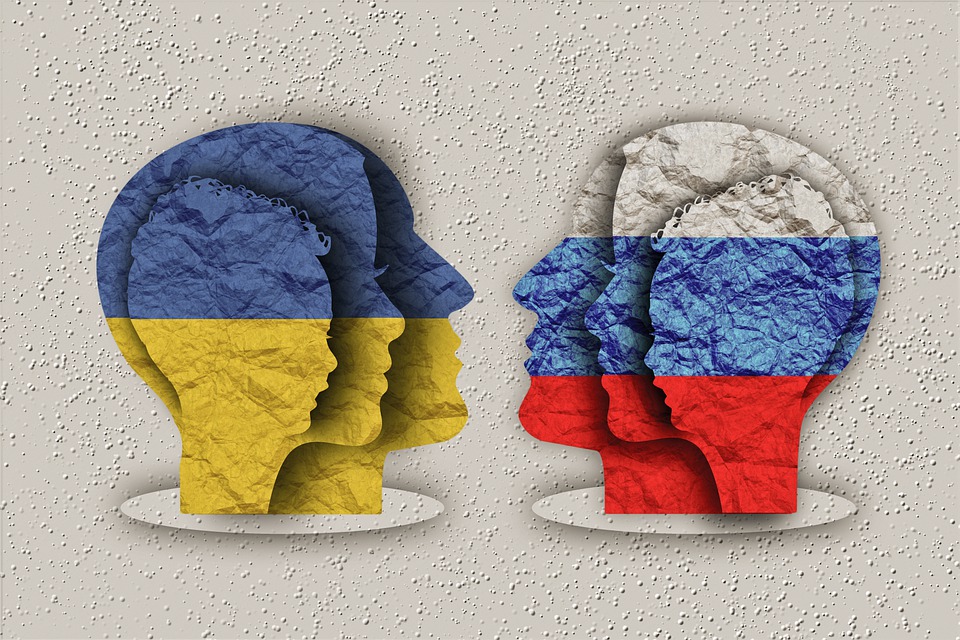Author: Zeng Lu
The conflict between Russia and Ukraine has killed thousands of civilians and made millions more refugees. The Russian-Ukrainian conflict has global repercussions, with disproportionate consequences for developing countries and the world's poorest people.
Total words2945About6minutes
Since the outbreak of the Russia-Ukraine conflict, 4,149 civilians have been killed in the conflict, and 6.4 million people have been forced to become refugees. The impact of the Russia-Ukraine conflict is also felt globally, with developing countries and the world's poorest populations being hit particularly hard.
exacerbate the global food crisis
The conflict between Russia and Ukraine has led to a sharp drop in food production and exports.In 2021, Ukraine fed some 400 million people around the world. Ukrainian and Russian wheat exports accounted for 30% of global exports, and corn and sunflower oil exports accounted for 20% and 70% to 80% of global exports, respectively. The conflict between Russia and Ukraine has led to a sharp drop in food production. In addition, more than 95% of Ukraine's grain, wheat and corn are exported through the Black Sea. During the Russia-Ukraine conflict, Ukraine's Black Sea ports such as Mariupol and Odessa were controlled by Russia, causing most of Ukraine's grain exports to be interrupted.
Russia-Ukraine conflict exacerbates global food price hikes.The United Nations (UN) report estimates that the new crown epidemic has caused global food prices to increase by 34% in the past year. The Russia-Ukraine conflict has further pushed up energy prices, leading to an increase in the price of chemical fertilizers, which are highly dependent on energy production. Since fertilizer costs are an important factor in food production, rising fertilizer prices further push up food prices. In April 2022, both wheat and corn prices will be more than 30% higher than in December 2021. In addition, Russia's control of Black Sea ports has prevented Ukraine from exporting food, disrupting global commodity markets and trade, further exacerbating global food price increases.
The conflict between Russia and Ukraine may trigger a food security crisis.Nearly forty countries in the world import more than 50% of wheat from Ukraine and Russia, most of which are developing countries. The conflict between Russia and Ukraine has led to sharp increases in the prices of fertilizers and wheat, jeopardizing agricultural production and impacting food security in developing countries. Even countries that do not import large quantities of food from either country have been hit by sharp increases in global food prices. Some people cannot afford enough staple food and have nutritional problems. At the recent Ministerial Conference on Global Food Security, United Nations Secretary-General Antonio Guterres said that the war between Russia and Ukraine has exacerbated climate change and the impact of the new crown epidemic, which may cause nearly ten million people to fall into a food crisis. If left unchecked, the crisis could last for years.
trigger humanitarian catastrophe and refugee flows
The conflict between Russia and Ukraine has led to a deterioration of the humanitarian situation in eastern and southern Ukraine.The escalation of military conflicts has put hundreds of thousands of lives at risk and has killed 4,149 civilians, including children. The war severely damaged civilian infrastructure and homes. Public services such as water, electricity, heating and emergency medical services are under enormous pressure. Access to safe drinking water in eastern Ukraine faces major challenges, exacerbating the risk of spreading infectious diseases such as cholera, a United Nations report said.
Russia-Ukraine conflict triggers refugee crisis.The United Nations refugee agency (UNHCR) estimates that 6.4 million Ukrainians have fled their homes into other countries, 901 of them women and children. Since the outbreak of the Russia-Ukraine conflict, more than 3.5 million Ukrainian refugees have flooded into Poland, and other Ukrainian refugees have fled to neighboring countries such as Romania, Hungary, and Moldova. In addition, more than 8 million people have been displaced within Ukraine, and hundreds of thousands more are trapped in conflict cities in desperate need of safe escape.
Ukrainian refugees pose long-term pressure on host countries.In the short term, the host country community needs to provide a large amount of food, shelter and other basic services for the millions of Ukrainian refugees who have concentrated inflow. In the medium to long term, host governments are under pressure to help refugees arrange jobs, provide social services, or return to their home countries. The influx of refugees takes up limited public resources such as housing, education, and medical care in receiving countries, increases the cost of basic social services provided by the governments of receiving countries, and may lead to the rise of nationalism.
Influencing energy security and climate action
The conflict between Russia and Ukraine has pushed up energy prices and affected energy security.Russian oil and gas production accounted for 12% and 17% of global supply, respectively. Sanctions by the United States, Europe and other countries on Russian oil and natural gas led to another surge in energy prices, further pushing up global inflation. In April 2022, crude oil and natural gas prices increased by nearly 50% compared to 2021. Russia imports about 40% of EU gas supply. The European Central Bank believes that the energy embargo may slow down EU GDP by 3% to 4%. The EU urgently needs to accelerate the transition to safer and more reliable alternative energy sources in order to get rid of its dependence on Russian energy and ensure energy security. Soaring energy prices are also hitting more vulnerable developing countries and communities hard.
Russia-Ukraine conflict accelerates energy transition and heightens uncertainty about climate action.The Russia-Ukraine conflict highlights the need to accelerate the transition to clean energy. As conventional energy prices rise, renewable energy becomes more economically attractive. In order to get rid of dependence on Russian energy, many European countries have turned to alternative sources such as imported coal or natural gas. The greenhouse gases produced by the combustion of fossil fuels such as coal, oil and natural gas are the main source of the climate crisis. In April of this year, the United Nations issued "Climate Change 2022: Mitigation of Climate Change", which stated that unless all sectors immediately reduce emissions deeply, the 1.5°C temperature control goal of the Paris Agreement will not be achieved. The Russia-Ukraine conflict therefore poses challenges for short- and medium-term climate action.
International Community Increases Aid to Ukraine
Many governments have increased humanitarian assistance to Ukraine.Donor countries have increased humanitarian assistance to Ukraine to meet basic needs such as food and medical care. The European Union has pledged to provide 830 million euros (about 900 million U.S. dollars) in humanitarian assistance funds to Ukraine. The United States is expected to provide about $2.7 billion in humanitarian aid. Germany will provide more than 370 million euros (about 407 million U.S. dollars) in humanitarian aid and 430 million euros (about 464 million U.S. dollars) to Ukraine and its neighboring countries to deal with a potential hunger crisis. Britain will provide 145 million pounds (about 187 million U.S. dollars) in humanitarian aid. Donor countries will also support countries such as Poland and Moldova to host Ukrainian refugees. The EU has agreed with member states to mobilize funds from the EU Cohesion (CF), the Regional Development Fund (ERDF) and the Public Investment Program to Support the Recovery from the Epidemic (REACT-EU) and has launched a new initiative "Cohesive European Action for Refugees (CARE)" to support Ukraine's neighbors Host refugees. China has also provided humanitarian aid to Ukraine and its neighboring countries on many occasions.
In May 2022, the European Council announced the establishment of a solidarity trust fund at a high-level international financing conference in Ukraine to support post-war reconstruction in Ukraine. Reconstruction is expected to cost hundreds of billions of dollars and decades.
Multilateral agencies mobilize humanitarian aid and emergency support.Multilateral organizations quickly mobilized support for Ukraine and its neighbours. The United Nations and its partners have pledged $1.7 billion in humanitarian aid to Ukraine. The International Monetary Fund (IMF) allocated $1.4 billion to support Ukraine's emergency response and mitigate the impact of the war. The World Health Organization (WHO) has allocated a $3.5 million contingency fund to support Ukraine's urgent medical supply needs. The World Bank (WBG) is providing $923 million in aid to support emergency critical services in Ukraine and will provide $30 billion to ease the global food crisis caused by the Russia-Ukraine conflict. UN Secretary-General António Guterres has urged Russia to release grain exports stored in Ukrainian ports and resume fertilizer exports to prevent a worsening of the global food security situation.
During the Russia-Ukraine conflict, UN agencies and their humanitarian partners played an important role in providing emergency food aid and refugee support.UNHCR supports and helps Ukrainian refugees who have been forced to flee their homes find shelter and safety. The World Food Program (WFP) provides food aid to desperate Ukrainians and refugees fleeing Ukraine. UNICEF works to alleviate the extreme hardship and urgent humanitarian needs of hundreds of thousands of Ukrainian children and their families caused by the armed conflict. The Russia-Ukraine conflict reflects the irreplaceable role of multilateral institutions in delivering certain types of global public goods, such as food aid, refugee support, health care, and climate change.
Developing countries recover or suffer
The Russia-Ukraine conflict has increased the debt burden of developing countries.Before the Russia-Uzbekistan conflict, the governments of developing countries spent an average of 16% of export revenue on debt repayment, and the debt repayment expenditure of small island developing States doubled. The COVID-19 pandemic has led to a sharp increase in public spending, and a sharp decline in foreign exchange debt service income from trade, tourism, and immigrant remittances, increasing the debt risks of developing countries. The conflict between Russia and Ukraine has led to a surge in the prices of bulk commodities such as energy and food, and the debt burden of developing countries that rely on food and energy imports has increased. In addition, the Russia-Uzbekistan conflict has disrupted commodity markets and financial markets, leading to rising bond interest rates in developing countries, increasing the debt burden of developing countries and eroding hard-won development achievements.
The conflict between Russia and Ukraine may intensify the competition for development aid resources.As donor countries and agencies aid Ukraine heavily, many donors are caught in the dilemma of reallocating aid resources, forced to choose between supporting Ukraine and supporting other developing countries and development goals, between supporting urgent humanitarian needs and supporting the long-term post-war Difficult choice between rebuilding. On the one hand, in recent years, global public goods such as the COVID-19 epidemic and climate change, and traditional development goals such as eradicating extreme poverty have become increasingly competitive for development assistance resources. After the outbreak of the Russia-Ukraine conflict, donor countries invested a lot of aid in Ukraine, which further intensified the competition for aid resources. On the other hand, as the COVID-19 pandemic hit global public health and economic development hard and squeezed the fiscal space of various countries, the scale of foreign aid from some donor countries declined. After the Russian-Ukrainian conflict broke out, many European countries raised their military budgets, which may further squeeze foreign aid budgets. Therefore, some developing countries may face more limited development assistance resources, which will affect post-epidemic recovery and long-term development.

All rights reserved, please indicate the source when citing.
References
https://news.un.org/en/story/2022/03/1113692
https://data.unhcr.org/en/situations/ukraine
https://www.ohchr.org/en/news/2022/06/ukraine-civilian-casualty-update-1-june-2022
https://reports.unocha.org/en/country/ukraine
https://www.unocha.org/ukraine/about-ocha-ukraine
https://www.csis.org/analysis/global-governance-after-ukraine
https://www.cgdev.org/blog/will-ukraine-crisis-mean-eu-aid-pulled-rest-world
https://www.hrw.org/news/2022/04/28/ukraine/russia-war-continues-africa-food-crisis-looms
https://www.energylivenews.com/2022/03/07/how-will-the-war-in-ukraine-impact-the-energy-transition/
https://reliefweb.int/report/world/ukraine-war-and-un-reform
https://www.bruegel.org/2014/04/ukraine-crisis-shows-global-governance-is-in-a-mess/
https://www.capitalgroup.com/advisor/ca/en/insights/articles/energy-impact-war-ukraine.html
